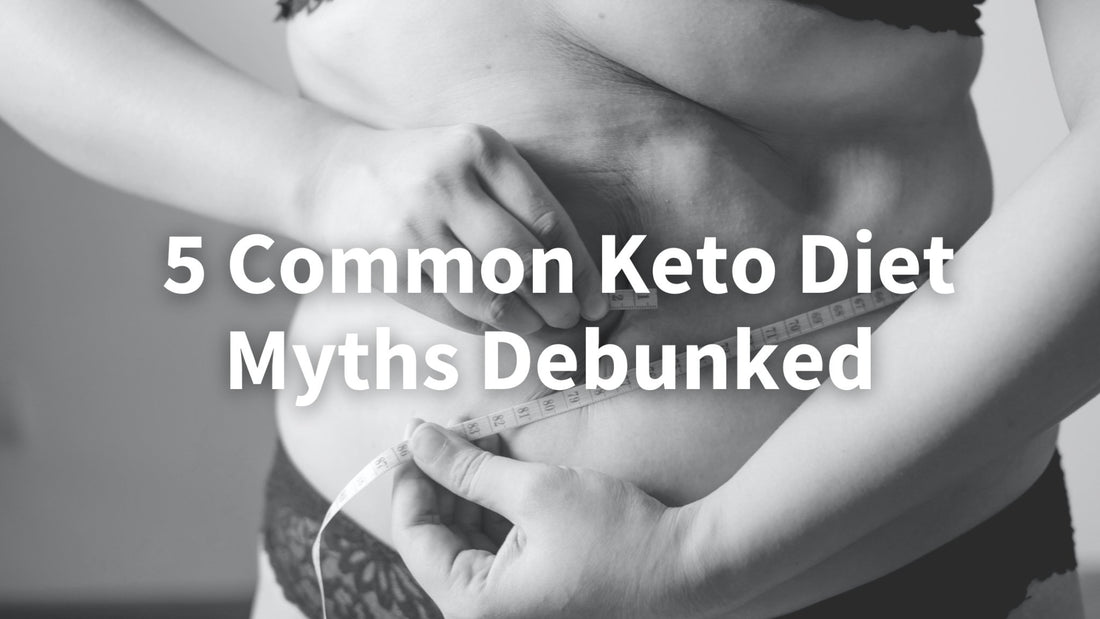
5 Common Keto Diet Myths Debunked
Gloria PalcichShare
The keto diet is a popular diet that focuses on high-fat and low-carb eating. With all the myths and misconceptions out there, it can be hard to know what’s true and what’s false.
In this blog post, we will debunk five common keto myths so you can make informed decisions about your diet.
-
You get fat from eating fat
It’s an age-old myth that fat makes you fat—but this isn’t true at all!
In fact, eating healthy fats can actually help with weight loss by keeping you feeling full longer and providing essential nutrients to your body.
Eating healthy fats like avocado, nuts, coconut oil, and olive oil is encouraged on a keto diet as they provide the essential fatty acids needed for optimal health and well-being.
-
The keto diet raises cholesterol
This myth is based on the misunderstanding of how cholesterol works in the body. While it’s true that a high-fat diet can raise LDL (bad) cholesterol, it also raises HDL (good) cholesterol—thus balancing out the effects of one another.
What really matters is the ratio between LDL and HDL cholesterol, not just the total amount of cholesterol in your system.
Studies have shown that when done properly, a keto diet actually lowers both totals as well as LDL cholesterol levels.
-
The keto diet is bad for your kidneys
The myth that a keto diet is bad for your kidneys has been debunked numerous times.
It was once thought that because the keto diet causes increased levels of uric acid in the blood it could potentially damage your kidneys over time.
However, recent studies have found no evidence to support this claim—in fact, some studies suggest that following a keto diet may even improve kidney function!
-
The keto diet may cause vitamin deficiencies
Many people worry about vitamin deficiencies when starting a ketogenic lifestyle—but this doesn't need to be an issue if you plan accordingly!
The key to preventing deficiencies is eating enough nutrient-dense foods such as dark leafy greens and nuts/seeds which are packed with vitamins and minerals essential for optimizing health while following the ketogenic diet.
It's also important to supplement with multivitamins if necessary to ensure you're getting all the nutrients you need for optimal health!
-
The saturated fat in your diet will cause blockages in your arteries
There has been some confusion around saturated fats lately because they are often seen as unhealthy or “unfit” for consumption due to their association with heart disease. This simply isn't true!
Studies have demonstrated time and time again that saturated fats have little to no effect on heart health when consumed in moderation. In fact, saturated fat intake has actually been linked to lower rates of heart disease in certain populations!
So don't fear eating foods like eggs or red meat—they're perfectly fine in moderation!
Conclusion
To sum up, there are many myths surrounding the ketogenic lifestyle but these can easily be debunked with further research into its benefits and risks.
Eating healthy fats does not make you gain weight; instead, it helps keep you feeling full longer while providing essential nutrients required for optimal health & well-being!
Also, remember to include plenty of dark leafy greens & other nutrient-dense foods into your meals while supplementing with multivitamins if necessary to prevent any vitamin deficiencies from occurring while following a ketogenic lifestyle!
With these tips in mind, you'll be sure to reap all of its benefits without having any adverse effects on your health & well-being! In case any keto myths still bother you, speak with our nutritionist and we'll clear them up for you!
References
https://www.ncbi.nlm.nih.gov/pmc/articles/PMC7071259/
